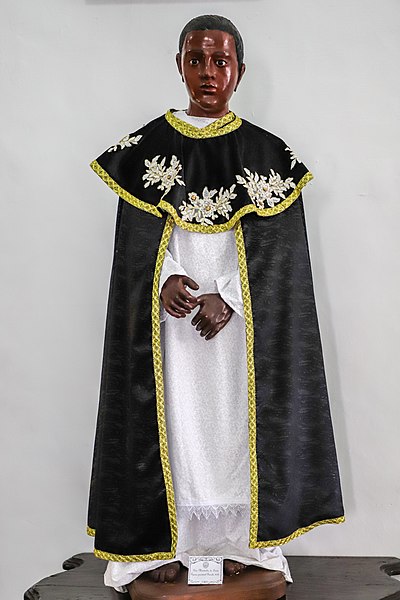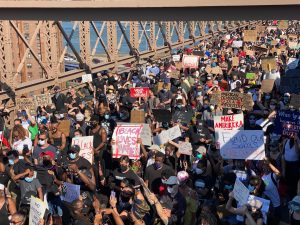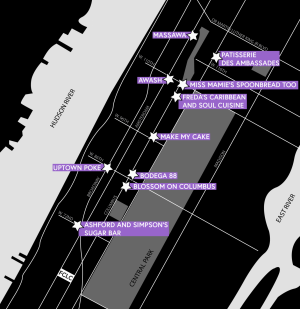Black Catholic History Month Should Be More Widely Recognized
The month presents an opportunity for Catholics and non-Catholics alike to recognize the Black community’s importance to the faith

PAUL R. BURLEY VIA WIKIMEDIA COMMONS
The feast day of St. Martin de Porres, the first Black American saint and patron saint of social justice, is on Nov. 3. He is one of the many Black religious figures to be celebrated during Black Catholic History Month.
November 22, 2020
This November has been one of the most hectic months in recent memory. From the nearly week-long wait for election results to the resurging coronavirus, these past days have been especially tumultuous. These events have also overshadowed an already underappreciated celebration: Black Catholic History Month. Although it has continued to be one of the less lauded festivities in both the Church and in society in general, it is an important reminder of the contributions Black Catholics have made to the faith as well as representing a long-overdue step towards seeing Black Catholics as equal members of the Church.
The National Black Catholic Clergy Caucus established Black Catholic History Month during its convention at Fordham University on July 24, 1990. The month of November was chosen due to a number of important dates for Catholics of African descent falling within the month. Among them is the feast day of St. Martin de Porres, the first Black American saint and patron saint of social justice, on Nov. 3.
A Dominican lay brother, de Porres was well known for his charity toward the poor and for building an orphanage and children’s hospital. Another important day is Nov. 13, the birthday of Augustine of Hippo. A doctor of the Church, Augustine was of Berber origin and, according to Calvin Troup of Penn State University, was critical of Roman imperialism in North Africa in many of his writings.
However, these saints do not entirely capture the impact made by Black Catholics, especially in American history. The largest slave revolt to happen in the 13 colonies prior to the American Revolution was the Stono Rebellion of 1739, launched by West African Catholics on Sept. 9, the Nativity of the Virgin Mary.
As the Church and society as a whole seek to increase the visibility and recognition of the contributions of ethnic and racial minorities, Black Catholics should be front and center.
Associate Professor Mark M. Smith of the University of South Carolina noted that the rebelling slaves were likely from the Kingdom of Kongo, where devotion to Mary was a key part of the country’s Catholic faith. The Catholicism of the Kongo is a legacy that is often forgotten even among those that recognize Black Catholic History Month, a blend of Western Christianity and African spiritualism that maintained a fierce independence from attempts by the Portuguese to influence its practice and application. The recognition of African Catholics’ rich tradition and history by the rest of the faithful should become a key part of Black Catholic History Month as a valid and necessary addition to the rich culture of the Church.
Black Catholics’ role in ending slavery went beyond the Stono Rebellion. The Haitian Revolution, one of the most successful slave rebellions in the Americas, was initially led by Toussaint L’Ouverture, a devout Catholic who had been educated by Jesuits.
Remembering such history also means we must look upon the failures of the Church in initially addressing slavery in the Americas and elsewhere. Indeed, many Catholics actively participated in owning and selling slaves. Charles Carroll, the only Catholic to sign the Declaration of Independence, was one of Maryland’s most prominent slave owners.
Many Catholic religious orders, including nuns, have spent the past several years confronting their racist legacy of owning slaves. Even after the abolition of slavery, the United States’ ecclesial authorities were not initially accepting of African Americans entering the priesthood. The first African American priest, the Venerable Augustus Tolton, wasn’t ordained until 1886 and was forced to study in Rome due to opposition in the States.
Despite the continued negligence of African American Catholics by both the Church and laity, many went on to become beacons of the faith. Tolton was instrumental in the growth of the Church in the city of Chicago in the 1890s, and his cause for canonization was endorsed by Pope Francis last year. Another former slave, Julia Greeley, delivered coal and food to the poorest families of Denver, Colorado, and is now on the cusp of sainthood. Her activities were often done under the cover of darkness and would continue even as her body became riddled with arthritis.
Sister Thea Bowman was one of the most persistent voices against racism and bigotry in the Church during her life, and her name has graced numerous schools and community centers. Her persistence in having the voices and experiences of Black Catholics heard is a struggle that continues to this day. She, too, is on the path toward canonization after her cause was endorsed by the American bishops in 2018.
These brief summaries of exemplary persons are just a taste of the thousands of stories of immense charity and holiness that can be found among Black Catholics. The fact that their stories and their month of celebration have gone under the radar is a shame upon a faith that has far too often looked over their contributions. While there have been positive developments, such as Archbishop Wilton Gregory being named the first African American cardinal, there is still a ways to go. As the Church and society as a whole seek to increase the visibility and recognition of the contributions of ethnic and racial minorities, Black Catholics should be front and center.
















Saint Luke Productions • Nov 25, 2020 at 12:29 pm
One of the most impactful ways to learn about Father Tolton and the history of racial relationships of Blacks and Whites in the US during the Civil War era is to attend our live stage production, Tolton: From Slave to Priest. More information is at http://www.ToltonDrama.com. Thank you.